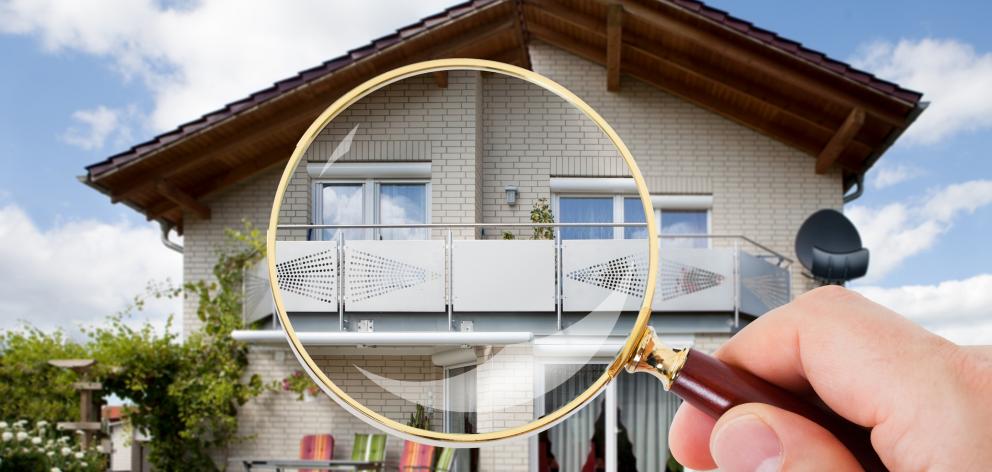
Dunedin’s hot housing market has some prospective buyers sweating, writes Shane Gilchrist.
Lucy Sylvester is pretty happy. She's just bought her first home.
Still, the road to residential bliss hasn't been particularly smooth. She'd lost out on three other properties in recent months, her offers fizzling in a hot Dunedin housing market.
Having worked for five years in Australia, where she had a "good income, which has helped with my deposit'', Sylvester decided to return to New Zealand in order to buy a house.
Living in Auckland, she realised she had little chance of getting into that's city's property market. So, when she was offered a job transfer to manage Kmart's Dunedin store, she took her chance.
She arrived in the southern city in August, began actively looking at houses a couple of months later, and soon discovered she had much to learn about the city's property landscape.
"It was a lot harder than I thought. The offers just weren't high enough. I put in an offer in the early $300,000s for one house and another in the same area sold for over $400,000.''
The 28-year-old began to read the signs on the faces of real estate agents, to know if she had a chance or not. She listened as she was told, more than once, just how wide of the mark she was.
"It was getting a bit disheartening but my partner had gone through the same process about a year ago and he told me to keep trying and the right one will come along.
"I had put in an offer on one house that needed a heck of a lot done to it. I also put in an offer on a house that didn't need much done at all. I think the one I've got is a happy medium,'' she says of the 1930s brick bungalow in Musselburgh on which her offer, in the early $300,000s, has just gone unconditional.
UNHAPPY BUYERS
Sylvester's story is nothing new to Dunedin realtor Liz Nidd.
The Otago-Southland regional director for the Real Estate Institute of New Zealand (REINZ) and head of Nidd Realty, she notes a 8.1% rise in the median house price in Dunedin in the past year, from $301,000 to $325,500, is hurting some prospective buyers.
"It is pretty hot. There are a lot of unhappy buyers out there, because they have missed out on what they thought was their dream home.''

Recent Quotable Value statistics reveal housing value in Dunedin has risen even more sharply; by 15.5% over the past year, to an average of $359,055. Compared to Dunedin's last property peak, in 2007, that represents a 25.4% increase.
Asked to explain the difference between the QV and REINZ figures, QV's Dunedin valuer Duncan Jack points out REINZ bases its data solely on sale price, "whereas ours are based on the sale price relative to capital value, that's how we assess the average value''.
(Also, unlike the median, the average value could also be skewed by a significantly high - or low - sale price. QV also takes into account many, but not all, private sales, whereas REINZ does not.)
Regardless, both sets of statistics strongly point in one direction, and that's up, up, up.
"Certainly, the market is buoyant. There is no denying that,'' Jack says, adding the key drivers are low mortgage interest rates and Dunedin's lower property prices, when compared to other centres.
"There is a fierce competition among buyers that is driving sales prices. I think people are looking to put in their best offer straight away rather than negotiate. And that has a snowball effect in regards buyer behaviour.
"We are seeing investors who, because of the 40% LVR, are looking outside of Auckland,'' he says of the lending restrictions introduced last year by the Reserve Bank in an attempt to cool the housing market.
"They can still buy something in Dunedin. And this is having some effect in that they are taking some houses that first home buyers might want.''
Nidd agrees: "There are no bargains to be had. They are a bit hard to find,'' she says, adding last week she had multiple offers on two modest properties.
"Quite honestly, they were the last properties in the world you would have expected to be so popular.
"The $200,000 to $300,000 price range is where a first home buyer would ideally like to purchase. There are fewer and fewer houses under $200,000. Some people have told me they are now having to spend $350,000, where they previously might have been in the $250,000-$300,000 range.
"I have heard a couple of anecdotal stories recently from parents whose children are having to lift their expectations of what they'll pay. They are getting a bit despondent because everything they are looking at has competition.
"It is a stretch for some people. But relative to other places in New Zealand, it is still pretty good.''
According to the recently released 13th Annual Demographia International Housing Affordability Survey, Dunedin's affordability has dropped slightly in the past year, from 5.2 to 5.4.

Released last month, the latest survey shows Auckland, with a median multiple of 10, remains the least affordable market in New Zealand.
Historically, housing has been regarded as affordable at three times the median income. In 1949, the average house cost 2.1 times the average annual salary. By 1989 that ratio was about 4.2. A ranking of more than 5 is judged "severely unaffordable''.
Legislative changes combined with insurance implications following the Canterbury earthquakes have also altered the landscape of the real estate game in Dunedin, and elsewhere, in recent years.
In particular, the Real Estate Agents Act 2008 introduced tougher penalties for errant real estate agents and companies. Yet one of the biggest twists has been the flow-on effect of the Christchurch earthquakes of late 2010 and early 2011.
Following the 6.3 magnitude earthquake of February 22, 2011, which generated more than $US12 billion in claims, according to global insurer Swiss Re, insurance companies responded by increasing levies and tightening their requirements in regards the state of properties.
Notably, this included the quality of electrical wiring, particularly for older houses. Though companies' definitions of an older house vary, it generally means dwellings built prior to 1945 or 1935.
Given this conservative climate, many real estate companies and, indeed, house vendors (the people who ultimately pay estate agents an agreed commission), have thus become proactive, supplying a raft of documentation for potential buyers, from land information memorandums (Lims) and electrical certificates to building and engineering reports.
Yet, a hot market such as Dunedin's means some are prepared to take a little more risk than others to secure a property.
"They are typically investors, who are a more sophisticated buyer, if you like,'' Nidd says.
"These days house purchase contracts, with all the small print and additional clauses, often resemble a Russian novel and that might put off the vendor, who might settle for a slightly less generous offer with fewer clauses.
"That said, if one of my kids was buying a home, I'd be very loath to let them make an offer with no conditions, such as building and electrical reports.''
'THEY WANT IT ALL'
Amid all this talk of housing affordability, do we need to regard our homes in a different light?
According to Quotable Value statistics, our average house size has almost doubled since 1940.

Back then, the average new house in New Zealand had a floor area of 112sq m. By 1950 that figure stood at 117sq m, and grew by about 10sq m per decade until 2010, when it reached 205sq m before scaling back a little since.
Maria Slade, a former business journalist who has recently written a book aimed at helping ‘‘ordinary people’’ get into the housing market, notes there is sometimes a marked gap between consumers’ expectations and financial reality.
And some of this has to do with a media bombardment of high-end, aspirational houses, she believes.
‘‘People are exposed to ideas about property far more these days. As the retirement commissioner points out, there is all this ‘property porn’ with messages about retiring to the country, having your place in the sun ... there are endless television shows that feature properties that you or I will never own, because they are so expensive.
‘‘A lot of real estate agents I’ve spoken to talk about younger first home buyers wanting a house with four bedrooms, a master bedroom with ensuite, a garage, a flat section, brick and tile ... they want it all.’’
A better approach might be to think of house ownership over a shorter time frame: perhaps five years, rather than, say, 10 or more, she suggests. That way, people are more likely to address current needs — or those of the immediate future — rather than paying for contingencies (i.e. all those extra bedrooms) that might not eventuate.
‘‘My view is that people wanting to get on the property ladder need to start at the bottom. Sacrifices have to be made. But people don’t have to live in that place forever. Pay down debt as fast as possible, build up equity and move on.
‘‘Interest rates are probably as low as they are going to be in a while, so this is the time to get rid of debt.’’

Having just bought a house within earshot of the commentary at Forbury Park Raceway in St Kilda, Tim Ford could be regarded as having put a buck each way in terms of his finances.
‘‘As far as paying off the mortgage goes, I think it’s important to still enjoy having some money, too, so I think I’ll adopt a middle ground,’’ the 25-year-old Otago Boys’ High School teacher says.
‘‘I don’t want the mortgage to take over my life, but I can see the appeal in getting rid of it and not having all that interest stacked up.’’
Ford took possession of his Kennedy St house last week . He paid just over $300,000 for the roughcast bungalow, which he bought privately.
‘‘It was more complicated than I expected, lots of paperwork and, I guess, a bit of uncertainty, mainly around some of the language to do with property. I mean, I’m a novice in this regard.‘‘I had been thinking about buying a house rather than actively looking,’’ he explains.
‘‘I grew up in this area, so that appealed, but it has only been financially realistic in the past year. I had some money invested in shares and, although I didn’t make an extravagant amount, it helped. ‘‘I wanted something that I could add a bit of capital gain to, but could add my own touch without being too extravagant.’’
A few doors down from St Clair School, Ford’s home is a ‘‘doer-upper’’, a place with potential. As a student, he did some painting to help pay the bills, so he’s got that covered. He also has a few mates who offer handy skills.
‘‘One’s a builder. I know another guy at work who is going to help me with landscaping.‘‘I’m looking to do some renovations and get some flatmates in at some point as I do up the rooms.’’

MAINTAINING AN INTEREST
A buoyant housing market notwithstanding, choosing a house is the easy bit, according to Darryl Stringer, a mortgage adviser at New Zealand Home Loans.
"Buying it is fairly easy. It's the paying it off that is the hard part and something you need to be mindful of from the start as it can save you a lot of money and stress and allow you to attain other things in life.''
Stringer says there is a lot of information about how to buy a house, but less about how to manage debt and attain financial control.
"Does a person want a loan for 30 years? If you upgrade from the house you're in now to a mansion in 10 years time, are you going to have to borrow for that? What's the strategy for getting out of debt or stepping up?''
He points out that although someone might step from one home to another and make gains in equity along the way, the cost of interest over the combined length of serial mortgages is sometimes overlooked.
"We try to focus attention on the interest cost people pay over the life of a loan. It becomes quite sobering for people as they realise the costs of, say, that $200k loan might range from $250k, if they paid it off early, or many times more than that if they paid it off over a long time.
"People think they will have made $100k if they bought a house for $300k and sold it for $400k years later. But if they worked out what they paid in interest over that time, they might have lost money, depending on the length of the loan.
"You can't always count on your financial gains to come from the increase in value of your property as it does not always occur,'' Stringer emphasises.













